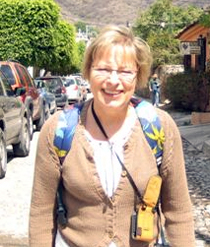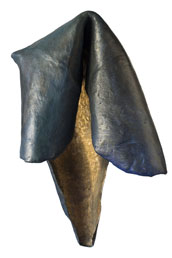Fort Good Hope
Johanna Van Zanten
For years Hank had invited me to visit him; I had finally accepted his invitation. Hank lived in the North West Territories, to be precise: in Norman Wells, a small industrial settlement–under a thousand residents–located just below the 66th N degree latitude, on the north bank of the mighty Mackenzie River, known to the locals as Deh-cho–Big River in the Dene language.
Norman Wells is 1370 miles north of Edmonton, a bit over twenty-two hundred kilometres as the crow flies. In the winter, which runs from October till May, the river ice forms a temporary highway, but travel is not recommended for rookies. Freight truckers are used to driving it, although it remains a risky trip at the best of times.
The only way into the settlement during the months without ice is by plane, or by boat. Upriver leads to Hay River and Great Slave Lake, while downriver (northwards), the river flows towards Fort Good Hope, Inuvik and eventually, the Beaufort Sea.
Hank was my neighbour in the Netherlands, until he left for Canada at age eighteen. As kids we attended the same school; our parents were members of the same church community. We were as close as siblings: we walked to school together and played together. Hank was one year older and thus always in a different grade from me.
Hank had three sisters; he was the second-born child. After Hank’s youngest sister was born, six years went by, until the eldest of the three younger boys was born.
I remember the boys’ births well. Hank and I would walk daily past the hospital, operated by nuns, where his mom recovered after each birth. Hank’s mom kept the most wonderful chocolates in a box by her bed and would give us one, each time we visited: a large truffle, soft creamy inside, covered with a solid dusting of cocoa, slowly melting in our mouths on our walk home.
Hank had a stutter that made him practically speechless at times; he received speech therapy in school, which he didn’t mind. Hank hardly ever stuttered when we were together. I heard his father make cruel remarks to him about it once.
Hank would not come with me to visit if mydad was home. He would leave immediately on the arrival of my dad, who had a loud voice and always said what he thought, apparently without any filters. Hank still is a gentle soul today.
After school, we would sometimes relax in the dog kennel, lying in the straw between the dogs, chatting, each with our head on a dog, the beautiful and gentle Scottish Collies named Tanya and Nora. Or we would play hide and seek with the neighbourhood kids.
After grade school, Hank entered the baker’s school, destined to follow in his grandfather’s and father’s footsteps. I would sneak away from my homework to visit with Hank in the bakery at the end of the street, where he was mixing the ingredients for bread, cutting the slabs of cake, or mixing the glaze for vanilla bars following the family recipe. The air was always warm in the bakery.
After his immigration to Canada, Hank occasionally made the trip home. We would visit then and exchanged stories of our adventures. Hank had moved from east to west and then north, ending up in Norman Wells eventually, accepting a position in Imperial Oil’s lab.
A number of workers lived in temporary buildings, flown in and out by their oil field service industry contractors, most on a two-week schedule. Herman chose to stay in “the wells” on his days off. After years of promises, it was time for me to visit Hank at this exotic location in the North.
In July 1980, a transatlantic flight took me from Amsterdam to Edmonton, my first trip to Canada. When the plane broke through the clouds, dropping low enough for me to see the landscape, the land seemed empty to me. I saw huge swatches of land of different colours, only sparse buildings, and the odd village strewn across the land, connected by very straight highways crisscrossing at right angles. Boy, was this land ever empty compared to flying over the Europe, was my first thought.
At the airport, I saw that most males were wearing hats with a protruding visor, logos printed across the cap. When I tried to read the logos, assuming that perhaps there was a connection with the wearers’ employment, I had to conclude that the words were without meaning to me.
The women were dressed in drab and unattractive styles. Everybody was wearing runners and jeans. Not many seemed to have fun, as far as I could see; I saw only closed-off faces. It gave me the impression that people had a hard life, were somewhat downtrodden.
As instructed by Hank, I got a taxicab to the closest hotel. This was easy. On advice of the driver, I chose the Riviera Hotel on the outskirts of the city, as I had no time to explore Edmonton. The hotel was bland and a little worn, but adequate. I had a bite to eat in the restaurant and went to bed early.
The next morning, I was supposed to catch the Imperial Oil Company plane at the airport for small aircrafts, adjacent to the international airport. I took another cab and pretty soon was seated in the small office of a large hangar where Esso (as Imperial Oil was then called) kept their private planes.
I was shocked to find out that I was going to have a ride in a six-seater airplane. Yes, Hank had not been a man of many words, and still isn’t. Never before had I traveled in anything smaller than a 767 Boeing.
I had to state my name and Hank’s name, which the receptionist, a guy in blue coveralls, checked against a document on a clipboard. My free ticket was a gesture of Esso’s compassion: a courtesy flight for visitors of those workers who did not fly out regularly and were living in isolation for extended periods.
The flight lasted nearly three hours. I was completely in awe all three hours. The landscape changed drastically soon after leaving Edmonton: no farms were left and fewer roads; dense bush was everywhere, interspersed with lakes and rivers.
This view slowly reversed the farther north the trip took us, until I saw mainly lakes and rivers and hardly any solid land. Obviously, nobody could live there; I concluded that it must be wilderness below.
Then the river Mackenzie came into view: one mighty thick snake, glistening through the dappled brown, silver-blue and brown-green patches of earth below us, meandering in lazy bends: an overwhelming presence in the landscape. A low string of mountains was visible to the right of the river and another range flanked it at the other side. Besides the tarmac of the airstrip, no asphalt roads ran through the village.
Hank was at the small airstrip to pick me up with a company truck. It was July, so the weather was good. He took me to the Atco trailer he shared with other employees, and his private room. It was more than adequate. Hank is a meticulous housekeeper and his digs were clean and cosy.
A number of trailers sat close together, lined up in rows, connected by wooden elevated walkways, useful after a snow fall, or when the thaw had set it and turned everything into a mud pit: moisture would sit on top of the permafrost, unable to seep into the ground. A snowmobile sat by one of the trailers, a squat scooter on skies, rather space-age and out of its element.





No Comments so far ↓
There are no comments yet...Kick things off by filling out the form below.